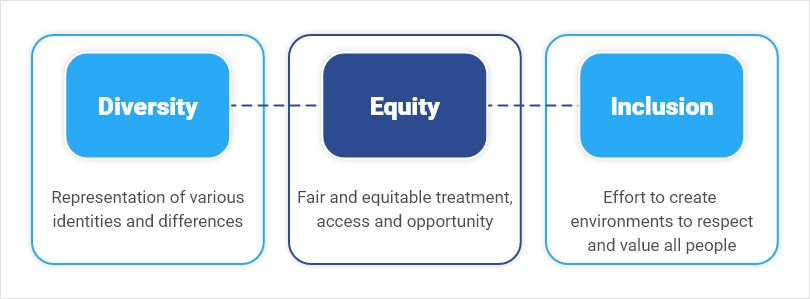
“We have no hope of solving our problems without harnessing the diversity, the energy, and the creativity of all our people.” – Roger Wilkins
Incorporating diversity, equity, and inclusion not only promote safer work environments but also fuel overall growth. As a McKinsey report highlights, companies in the top percentile for ethnic diversity experience a remarkable 36% increase in profits compared to their counterparts.
But implementing meaningful diversity and inclusion initiatives is easier said than done!
How can you ensure that your efforts have a tangible impact on your organization?
How can you measure and evaluate the results?
The answer lies in directly asking your employees through DEI survey questions. They let you assess employee perceptions and thoughts regarding diversity in your organization.
That’s what we will explore in this blog.
We’ll delve into the significance of diversity, equity, and inclusion and explore its importance. We will provide sample questions to help you create impactful DEI surveys, gather invaluable insights, and drive positive change within your company.
Let’s start with the basics!
Watch: What Is Diversity, Equity and Inclusion?
What is Diversity, Equity, & Inclusion?
Diversity, Equity, and Inclusion (DEI) focus on promoting fairness, equality, and acceptance within organizations, communities, and society. They are the three pedestals of an organization’s culture and define how welcoming your workplace feels to all employees.
DEI is about creating an environment that encourages everyone’s participation and provides equal opportunity to every employee, regardless of their background, ethnicity, race, and culture.

Let’s break DEI into three parts for better understanding:
Diversity
Do you know that 57% of employees want to see more diversity in their organization?
Diversity refers to the representation and inclusion of individuals from different backgrounds, including but not limited to race, ethnicity, gender, sexual orientation, age, disability, religion, socio-economic status, and cultural background. It recognizes and values the unique perspectives, experiences, and identities that people bring to the organization. Workplace diversity implies accepting these differences and treating each individual equally and fairly.
Equity
Equity focuses on ensuring fairness and justice by providing everyone with the necessary support and resources to thrive. It aims to treat all employees equally and provide them with equal opportunities to learn and grow. It acknowledges that individuals have different starting points and that certain groups may face systemic barriers and disadvantages. Equity involves actively addressing and removing these barriers to create equal opportunities and outcomes for all.
Inclusion
Do you know that 61% of the employees still “cover” or “hide” some personal dimension to get absorbed in their company by not bringing their complete authentic selves to work?
Inclusion is the practice of creating a supportive and welcoming environment for people with different identities. It goes beyond mere representation by actively engaging diverse perspectives, fostering respectful dialogue, and valuing everyone’s contributions. Inclusion recognizes that diverse voices and experiences are essential for innovation, creativity, and organizational success.
What Is a Diversity, Equity, & Inclusion Survey?
Though more than 70% of organizations aim to establish DEI initiatives, only 47% have the infrastructure to realize it.
This gap between expectations and reality needs to be bridged. That’s where DEI surveys5 can come in handy.
A DEI survey is a tool to assess and understand employees’ or stakeholders’ perspectives and perceptions regarding diversity, equity, and inclusion within the workplace. It lets the employees anonymously share their real feelings, experiences, and opinions on the company’s diversity and inclusive policies.
DEI surveys typically consist of a series of questions that cover a wide range of topics, including demographic information, experiences of discrimination or bias, awareness of organizational policies and initiatives, perceptions of inclusivity, and suggestions for improvement.

The questions are designed to gather quantitative and qualitative data that can help organizations identify areas of strength, areas for improvement, and specific actions that can be taken to promote diversity, equity, and inclusion.
Here are a few parameters that DEI surveys focus on:
- Do employees feel the workplace is comfortable to work at?
- Do people with different identities feel respected and valued?
- Do diverse groups of individuals have their say in policy and decision-making?
- Do people view the workplace as safe and inclusive?
- Are employees provided with equal opportunities to develop their skill set?
You can run separate DEI surveys or include survey questions about diversity, equity, and inclusion in your employee engagement surveys or pulse surveys.
25+ Diversity, Equity, and Inclusion (DEI) Survey Questions
Here are some example questions that can be included in a Diversity, Equity, and Inclusion (DEI) survey to measure different parameters:
Intersectionality DEI Survey Questions

- What is your age range?
- What is your gender identity?
- What is your ethnicity or racial background?
- What is your sexual orientation?
- Do you have any disabilities or impairments?
- How comfortable do you feel expressing your authentic self at work?
- Do you believe that people from diverse backgrounds have equal opportunities for advancement within the organization?
- Are there visible role models within the organization that you can relate to?
- How inclusive do you find the organizational culture and values?
- On a scale of 0-10, how do you rate executive team efforts to promote inclusivity?
Questions on Awareness of DEI Policies & Initiatives

- Are you aware of the organization’s diversity and inclusion policies?
- Have you received training on unconscious bias or diversity and inclusion?
- Do you feel that the organization communicates effectively about its DEI efforts?
- What steps can be taken to promote inclusivity in the company?
Tracking Opportunities for Growth and Development
- Do you believe that there are equal opportunities for career growth and development for individuals from diverse backgrounds?
- Have you been provided with resources and support to advance in your career?
- Are there mentoring or sponsorship programs available that support individuals from underrepresented groups?
- On a scale of 0-10, how will you rate the implementation of equity in the company? (eNPS question)
- Which equity initiative by the company did you like the most? Can you explain the reason behind this?
- Do you think the career advancement policies of the company are fair for all, regardless of their background?
Gauging Experiences of Discrimination or Bias

- Have you personally experienced any form of discrimination or bias within the workplace?
- Have you witnessed any discrimination or bias towards others in the workplace?
- Do you believe the organization takes appropriate action to address incidents of discrimination or bias?
Measuring Inclusive Workplace Practices
- Are diverse perspectives actively sought and valued during decision-making processes?
- Are inclusive practices in place to accommodate diverse needs (e.g., religious observances, parental leave)?
- Are there employee resource groups or affinity groups that support underrepresented communities?
- Which inclusivity initiative taken by the company, did you like and why?
These are just a few examples of different question types to include in your DEI surveys. To capture meaningful data, you can customize the questions based on your organization’s goals, context, and desired outcomes.
Importance of DEI surveys
DEI surveys are crucial in understanding and addressing diversity, equity, and inclusion within organizations. Here are the key reasons why DEI surveys are important:
Data-Driven Decision Making
DEI surveys provide quantitative and qualitative insights into the work environment to aid decision-making processes. You can use the survey data to identify gaps, areas for improvement, and specific challenges related to diversity, equity, and inclusion. Then, channel the insights into creating a more inclusive and equitable environment.
Awareness & Transparency
DEI surveys raise awareness about the experiences and perceptions of employees or stakeholders regarding diversity and inclusion. The employees can easily voice their concerns, share their experiences, and contribute to shaping the organization’s DEI efforts. It also shows your commitment to promoting transparency and inclusivity by proactively seeking feedback and listening to employee concerns.
Identification of Barriers & Biases
As mentioned above, DEI surveys are an excellent asset for identifying systemic barriers and biases within the organization. They can uncover discrimination, bias, or exclusion patterns that may hinder the progress of individuals from underrepresented groups. The data can help to implement targeted strategies to eliminate such bias and create a more inclusive environment.
Measurement of Progress & Goal Setting
DEI surveys serve as a benchmark to measure progress over time. By conducting a survey periodically, organizations can track the effectiveness of their DEI initiatives and determine whether they are making positive changes. Surveys also help set goals and objectives for future DEI efforts, allowing organizations to monitor their progress toward creating a more diverse and inclusive workplace.
What Is the Objective of the DEI Surveys?
A DEI survey aims to gather data and insights to assess, understand, and improve diversity, equity, and inclusion within an organization or a specific context.
Assessing the Current State
The survey helps to gauge the current state of diversity, equity, and inclusion within the workforce. It provides a measurable means of people’s experiences, perspectives, and perceptions of individuals regarding various DEI-related factors. You can compare the data for different people and take the necessary steps.
Identifying Gaps and Challenges
One of the key purposes of conducting DEI surveys is to identify inclusivity-related gaps and challenges within the organization. They highlight disparities in representation and opportunities, if any, for different groups. This information can highlight specific areas where you need to focus your efforts.
Tracking Progress and Evaluating Impact
The data from the DEI survey is essential for optimizing diversity & inclusion policies and initiatives. It enables you to track the progress over time and measure the effectiveness of their DEI initiatives in making positive changes. It also lets you evaluate the impact of their efforts and make data-driven adjustments as needed.
10 Tips to Create an Effective & Informative DEI Survey Campaign
To create a compelling DEI survey, you must go beyond asking demographic survey questions. Understanding how safe, respected, and inclusive your employees feel while working for the organization is essential.
You can follow the following tips to create an impactful survey campaign to measure the diversity, equity, and inclusion within your organization.
Set Clear Survey Objectives
Make sure to be specific about your corporate DEI objectives. Include diversity survey questions that match your business’s diversity goals. Also, transparency is the key to conducting effective DEI surveys. Always communicate with employees how their input will be beneficial in changing the DEI strategies and policies.
Draft the Right Questions
Include specific diversity and inclusion questions in your surveys to gather adequate feedback data. Frame the questions concisely and crisply, leaving no room for assumptions. Also, try to exclude questions your employees view as “insensitive,” as they may affect the survey response rate. You can also include a combination of open-ended questions, Likert-scale questions, multiple-choice questions, and rating-scale questions to make your surveys more engaging.
Keep the Survey Anonymous
Making the survey anonymous will allow the employees to open up. Of course, many employees will not feel comfortable sharing their genuine opinions when they know their identities are being revealed. Anonymously collecting responses will also increase the response rates of the survey. Inform the employees about the survey’s anonymity at the beginning to make them feel comfortable while filling it out.
Provide Context & Definitions
To avoid ambiguity, provide clear definitions and explanations of diversity, equity, and inclusion concepts used in the survey. It will ensure that respondents clearly understand the terms, reducing misinterpretation and providing more accurate data sets.
Use Skip Logic
Sometimes, people may hesitate to answer specific sensitive questions. It’s better to keep the survey questions optional. Allow your respondents to skip the questions they don’t want to answer. You can also use a survey tool with a skip logic feature. It will take the user to the next relevant question once they’ve skipped a particular question.
Analyze the Results & Make Necessary Changes
Employees might feel their input was wasted if there is no update from management on how the feedback is being implemented. Share the survey findings to let your employees know their opinions and feelings are appreciated. Also, inform them about the steps you plan to take based on the data to improve their experience.
Consider Intersectionality
It’s important to recognize that diversity and inclusion comprise various dimensions, including race, gender, age, disability, sexual orientation, and more. So, add questions that account for the intersectionality of individuals’ identities and experiences. It would help to understand each individual’s perspective comprehensively and set appropriate benchmarks.
Collaborate with Employee Resource Groups (ERGs)
Engage with ERGs or affinity groups within your organization to gather insights and input while designing the survey. These employee-led volunteer groups aim to foster a diverse and inclusive working environment. Their input can help ensure that the survey accurately captures the concerns and experiences of diverse employee populations.
Consider Survey Timing & Frequency
Since you need to collect the DEI survey data periodically, it makes sense to determine the optimal timing and frequency to conduct the survey. It would ensure maximum participation and minimize survey fatigue. You can run the survey annually or semi-annually, track the progress over time, and assess the effectiveness of implemented changes.
Establish Accountability & Ownership
Another way to ensure that feedback from the DEI survey is being addressed on time is to assign clear accountability to leaders or teams within the organization. Ask them to follow up on the survey findings and monitor the implementation of necessary changes. Regularly review the progress and provide updates to employees, showcasing the organization’s dedication to creating an inclusive work environment.
Use DEI Surveys to Empower Your Business With an Inclusive Workspace
Building an inclusive workplace where everyone feels included, respected, and safe is key to employee satisfaction and overall growth.
By asking the right workplace diversity questions, you can gain valuable insights into how well your company is implementing DEI policies, identify areas for improvement, and set benchmarks to evaluate your future performance.
Start by deploying a robust survey tools like ProProfs Survey Maker. It will help to reduce manual efforts in designing and analyzing the DEI surveys. Then, set up proper access permissions to ensure data anonymity and protect respondents’ privacy.
FREE. All Features. FOREVER!
Try our Forever FREE account with all premium features!









